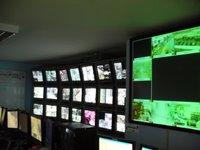See Mee
 (The CCTV control room in East Ham.)
(The CCTV control room in East Ham.)Today we went to the "best" CCTV station in London to see what the current state of British security is like. CCTV stands for Closed Circuit Television, and it is essentially a network of security cameras placed in various locations in each of the 30-odd bouroughs of London. We went to the station located in East Ham, and I feel that it was the perfect day to do this type of thing; the weather was cloudy and rainy, and thus perfect for some good government conspiracy theorizing. The station is located in a sort of bland, almost rundown building, and once we were buzzed in we had to pass through a narrow hallway and a seemingly endless series of green doors until we reached a reception room. We then divided into two groups to see the control room, and I thought it was kind of surprising that we were allowed to take photos inside of it, so long as we didn't "zoom in on the monitors." I think I actually found this to be the most problematic part of the entire tour; if this is such an incredibly secure room, and the monitoring that the employees do there is so important, why are outsiders with no security qualifications allowed to take photos? We could've easily zoomed in on anything that we wanted. It seems an odd sort of irony that we were watching people, but almost weren't supposed to acknowledge that fact.
I was in the first group to tour the control room, and as soon as we entered it I felt some tension between certain people in the group and the two station managers that led the tour. The tension stemmed mostly from the fact that the managers made statements that sounded as if they were completely certain that what they were doing was for the greater good, and that there was no questioning it. However, there were definitely some people in our group of liberal Liberal Arts students that questioned it; needless to say, there were some interesting exchanges. There was also a female control room employee watching monitors right in front of us, and when asked whether or not she liked the cameras, she said that although it is a bit creepy to know that people can basically watch your every move on camera, she is glad that they exist for security reasons.
My take:
One thing that I found a bit suspicous about the whole visit was that when someone posed the question of whether or not the cables that stream the camera feed to the station have ever been tampered with or hacked, the two managers answered "no" in exactly the same tone of voice at exactly the same moment. This led me to wonder, why did that response sound rehearsed? That, however, was about as conspiracy theory-ed as I got. I personally don't see what the big deal is if there are cameras around the city. Yes, I understand that a lot of people feel that this is an invasion of privacy, but I don't have anything to hide at the moment, and if cameras mean that the streets will be more secure, then I don't really have a problem with them. If (and I suppose when) this technology is used by the government or anyone to enforce rules that don't support the freedoms that we currently enjoy, then I will have a problem with it. I feel like this visit exposed me to the fact that we are much closer to a 1984 -like society than I would have thought. I did find kind of disturbing the fact that, on average, one can appear on camera about 300 times a day in central London. It's very bizarre to think that I could be photographed that many times a day, especially when I am just a visitor.
One concern of mine, though, is what are the implications of simply using cameras to catch criminals instead of creating preventitive programs, legislation, etc., to try to curb crime in the first place? If lots of money, time, and effort are put into catching criminals instead of preventing "criminal" behavior, then I don't think that crime will ever actually decrease; it seems like it will just continue at its current and alarming rate. Not that I believe that crime would necessarily decrease on a large scale even with preventitive measures (that would take a worldwide revolution, and I don't think that will occur, barring some sort of universal catastrophe), but maybe some small scale changes would occur. Because while the CCTV station managers said that crime decreases when a new camera is installed, they also said that when this happens, crime in another area goes up because the criminals simply shift their location. And apparently this shift is not even permanent because the managers also said that surveiled areas sometimes return to their previous levels of criminal activity. So, are the cameras even effective? Please, ponder with me.


0 Comments:
Post a Comment
<< Home